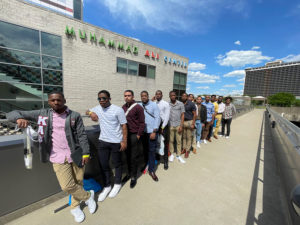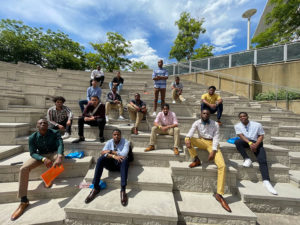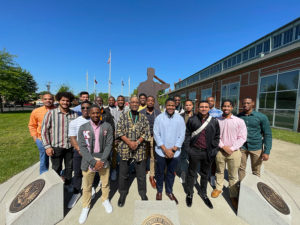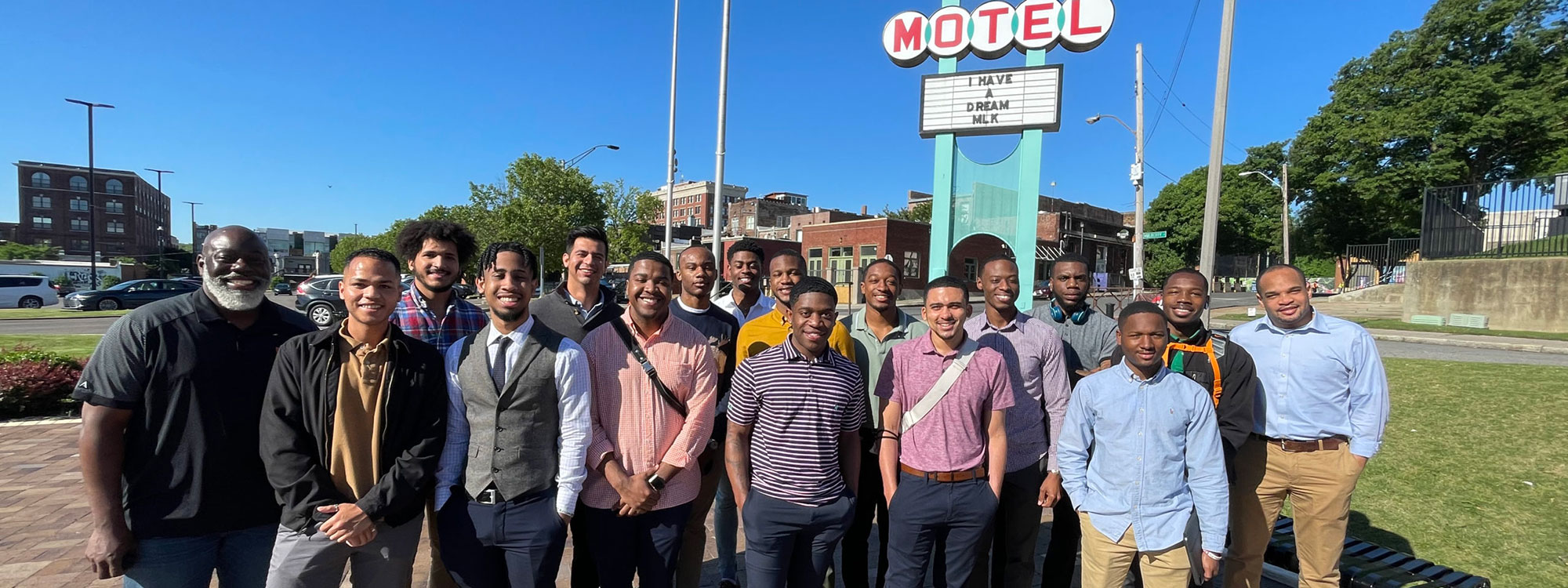When 13 students from Brothers United for Excellence started a five-day tour of some of the most renowned museums in the country, they learned more about what it meant to be men of color during the civil rights era and what it means to be men of color today. They discovered what it takes to build a multiculturally-just society and the role they continue to play in building that future.
“I think it’s so important for students to be exposed to opportunities off campus that better their sense of who they are, how they see the world around them, and how they hope to impact others,” said Daniel Dominguez, coordinator in the Office of Multicultural Student Life. “When students are able to step out of the classroom and engage in learning in a unique way, it gives them a chance to see what leadership, service, compassion, and justice look like throughout history and shape it for themselves.”
Christian David Rivera, a senior in Supply Chain Management and one of the students on the trip, noted “As an immigrant and an Afro-Latino man I felt it would be an incredible opportunity to expand my knowledge on history I learned in school and history that had not been taught to me in school. It was also a great opportunity to help surround myself with other students of color who understand the struggles, whether small or large, of being a man of color at this college, in this state, and in this country.”
Noah Dandridge, a fellow senior Supply Chain Management major, said he was hoping to learn more about the history of the country and the impact it has on society. “I wanted to learn more about African American history, cultural differences, and to interact and have fun with other minority male students.”
 The group visited six museums in three cities that were all dedicated to telling the story of racial and ethnic injustice in the past and present, and how important creating a multiculturally just society is. In Memphis, they visited the National Civil Rights Museum at the Lorraine Hotel and the Stax Museum of American Soul Music. While in Louisville, the group toured the Muhammed Ali Center and the Speed Art Museum. The final stop was in Cincinnati where they visited the National Underground Railroad Freedom Center and the Taft Art Museum.
The group visited six museums in three cities that were all dedicated to telling the story of racial and ethnic injustice in the past and present, and how important creating a multiculturally just society is. In Memphis, they visited the National Civil Rights Museum at the Lorraine Hotel and the Stax Museum of American Soul Music. While in Louisville, the group toured the Muhammed Ali Center and the Speed Art Museum. The final stop was in Cincinnati where they visited the National Underground Railroad Freedom Center and the Taft Art Museum.
Dominguez noted a particularly impactful moment during their time at the Speed Art Museum in Louisville, featuring the Promise, Witness, Remembrance exhibit, an exhibit dedicated to sharing the life and death of Breonna Taylor, and the year of protests that followed.
“Although it wasn’t a premeditated stop on the trip, it became a significant moment on our Civil Rights Tour,” explained Dominguez. “What stood out to me the most was that after being engulfed in racial history from previous museums, the Promise, Witness, Remembrance exhibit instantly brought the students back to the present day of racial and ethnic injustice that they themselves have experienced. In conversations that followed the visit to Louisville, students recognized that even though the civil rights movement was significant, there was still a need to continue to push forward in creating an equitable and just society.”
Rivera echoed Dominguez, noting how impactful the exhibit was. “It was such a touching and raw exhibit. It was a dark room with black walls and a timeline of Breonna Taylor’s life up until the moment of her murder. The room was illuminated by a beautiful bright teal portrait of Breonna Taylor looking as lively as ever.”
In addition to learning about the history of people of color in America from the Atlantic Slave Trade, the civil rights movement, and modern-day slavery in forms of child labor and human trafficking, the students were able to build relationships with each other and the staff participating on the tour with them.
 One of Rivera’s biggest goals was to learn about individuals and success stories that he wasn’t taught previously. He and his fellow students were able to take away more knowledge of American history that can often time leave gaps in fully understanding the past in order to move forward as a society.
One of Rivera’s biggest goals was to learn about individuals and success stories that he wasn’t taught previously. He and his fellow students were able to take away more knowledge of American history that can often time leave gaps in fully understanding the past in order to move forward as a society.
“I think one of my biggest takeaways from the trip was an understanding of just how important it is to be aware of history,” said Rivera. “Your own history. And in our case, the American education system doesn’t teach us our history, it teaches white history. I think there is so much to learn, so many stories to be inspired by, and stories that could translate to today and inspire leaders in the making.”
When asked what role the civil rights movement played in building a multiculturally just society, one student replied “I believe it played a major role in paving the way for my generation to fight back and make a change for our society. We have so many privileges that our ancestors didn’t have, and it amazes me how much opportunity we have to create a better world.” Another student explained, “The civil rights movement proved that there is power in unity, power in mobilization and that a win for one minority is a win for all other minorities in America.”
Tyvi Small, vice chancellor for Diversity and Engagement, noted the importance of such programming, expressing that experiences such as this one can positively impact a student’s time at UT. Small and others recognized the importance of helping students learn more about the world around them and what they can do to make a difference.
 “This was a partnership between Brothers United for Excellence, Diversity and Engagement and Student Life,” said Small. “As we thought about ways to engage males of color on campus as well as help them navigate conversations about racial and social injustice, we thought this would be a great opportunity to engage then in conversations about civil rights in our country.”
“This was a partnership between Brothers United for Excellence, Diversity and Engagement and Student Life,” said Small. “As we thought about ways to engage males of color on campus as well as help them navigate conversations about racial and social injustice, we thought this would be a great opportunity to engage then in conversations about civil rights in our country.”
“When attending any university, community building is essential to retention and belonging for any student,” said Dominguez. “Particularly at the University of Tennessee, which can be classified as a predominantly white institution, it’s even more crucial for our men of color, who may not get opportunities to connect often, know that they have a community here. This tour provided an intentional resource to better that community and to hopefully continue it when arriving back to campus.”
When asked, 100% of student attendees and survey respondents believe this trip contributed to building new relationships with fellow peers, fulfilling one of the main goals of this tour. Small noted, “Students ended the trip more knowledgeable about the civil rights movement, more connected with fellow peers, and more motivated to engage with their local communities.”
And this trip has accomplished this goal and helped the students create a strong bond, with Rivera noting how close he remains with his fellow attendees.
“I was very hesitant about going on this trip. I wasn’t very familiar with all the other students going on the trip and I was not sure what to expect,” said Rivera. “Yet I decided to push myself and I am beyond thrilled that I did. In one way or another, every person on the trip bonded and we all have this shared experience we will keep with us through life which was the Civil Rights Tour Trip. To this day, all of us guys who went on the trip still talk through group chats…I encourage any fellow student who may doubt or is on the fence about going on the trip to just take the chance and do it.”
Dandridge also noted that he enjoyed the trip and learned a lot to help him understand valuable history. He noted he was able to build strong connections with his fellow students, as well as the staff traveling with them.
This tour is just one of many other ways Small, Dominguez, and others are working to engage and support men of color here at UT. And Small has been encouraged by the success of this trip to plan for another group of students to take the same tour and to create similar programming in the future.
Contact: Alyssa Seisser, 865-974-9200
